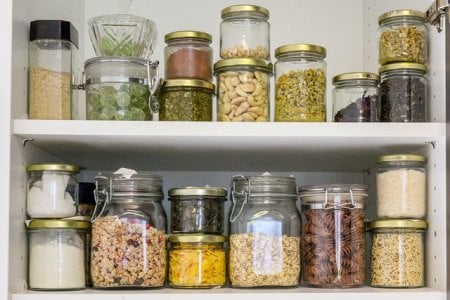Australians grapple with soaring costs of everyday pantry staples
By
Seia Ibanez
- Replies 12
The rising cost of living is a concern for everyone, especially those living on a fixed income.
A recent analysis has revealed a startling increase in the prices of common pantry staples, leaving many Australians feeling the pinch.
According to a report by Compare the Market, Australian shoppers are now paying up to twice as much as they were three years ago for everyday items such as olive oil and a bag of mixed peas and corn.
The study shows that no shopping aisle has been spared from the impact of inflation since 2021, with prices of common items jumping by a staggering 40 per cent.
The most significant price hike was seen in Monini Classico Extra Virgin Olive Oil, which has doubled in price from $12 in 2021 to $24 this year. This increase is attributed to the devastating drought and fires in Europe, which have severely impacted olive production.
A few months ago, a price hike was reported for a Woolworths home brand olive oil by $1.20 in 12 months. It was also reported that Coles had a price hike for its olive oils. You can read more about these stories here.
Meanwhile, a simple bag of McCain mixed vegetables has seen a 54 per cent price increase, rising from $2.60 to $4.
Other pantry staples have not been spared either. The price of Bega Tasty Cheese Block has jumped by $2.50 (31 per cent), Red Rock Deli Sea Salt chips are up 35 per cent, and the cost of a 10-pack of Coca-Cola 375ml has risen by 32 per cent.
Chris Ford from Compare the Market points out that while an increase of a few dollars may not seem significant at first glance, it can have a major impact on a household's weekly budget.
‘We know that the big supermarkets are trying to lure in customers by locking in or dropping prices, but our analysis shows that many of the essentials we shop for each week have actually increased since last year,’ he said.
'In a time where we're seeing energy bills skyrocket, feeling pain at the petrol bowser and seeing insurance premiums rise, the last thing we want is for Australians to be forking out more than they need to on everyday items they need.’
Ford also warned that recent extreme weather events and potential increases in shipping costs could contribute to higher checkout prices in the near future.
‘Which is why it’s more important now than ever before for Aussies to take back control, wake up to waste and pay as little as possible for the groceries we need.’
Shoppers have been urged to shop around before they go in-store to make sure they are getting the best price.
The rising cost of groceries has not gone unnoticed by the government.
Supermarket prices have become a political hot topic in recent weeks as the government seeks to reassure voters about their record on the cost of living.
A review of the Food and Grocery Code of Conduct, which governs the relationship between retailers, wholesalers and suppliers, is underway.
Prime Minister Anthony Albanese has expressed concern about the prices consumers are paying at the big supermarket giants.
The government has hinted at the possibility of ordering the Australian Competition and Consumer Commission to launch an inquiry into deceptive prices.
'We want to make sure that people are paying the lowest possible prices when they get to a checkout. That's our priority, along with other measures to assist people,' PM Albanese said.
 Have you been feeling the pinch with the increase in your pantry staples? Do you have tips on saving more or how you can buy them at a much lower price? Share them with us in the comments below!
Have you been feeling the pinch with the increase in your pantry staples? Do you have tips on saving more or how you can buy them at a much lower price? Share them with us in the comments below!
A recent analysis has revealed a startling increase in the prices of common pantry staples, leaving many Australians feeling the pinch.
According to a report by Compare the Market, Australian shoppers are now paying up to twice as much as they were three years ago for everyday items such as olive oil and a bag of mixed peas and corn.
The study shows that no shopping aisle has been spared from the impact of inflation since 2021, with prices of common items jumping by a staggering 40 per cent.
The most significant price hike was seen in Monini Classico Extra Virgin Olive Oil, which has doubled in price from $12 in 2021 to $24 this year. This increase is attributed to the devastating drought and fires in Europe, which have severely impacted olive production.
A few months ago, a price hike was reported for a Woolworths home brand olive oil by $1.20 in 12 months. It was also reported that Coles had a price hike for its olive oils. You can read more about these stories here.
Meanwhile, a simple bag of McCain mixed vegetables has seen a 54 per cent price increase, rising from $2.60 to $4.
Other pantry staples have not been spared either. The price of Bega Tasty Cheese Block has jumped by $2.50 (31 per cent), Red Rock Deli Sea Salt chips are up 35 per cent, and the cost of a 10-pack of Coca-Cola 375ml has risen by 32 per cent.
Chris Ford from Compare the Market points out that while an increase of a few dollars may not seem significant at first glance, it can have a major impact on a household's weekly budget.
‘We know that the big supermarkets are trying to lure in customers by locking in or dropping prices, but our analysis shows that many of the essentials we shop for each week have actually increased since last year,’ he said.
'In a time where we're seeing energy bills skyrocket, feeling pain at the petrol bowser and seeing insurance premiums rise, the last thing we want is for Australians to be forking out more than they need to on everyday items they need.’
Ford also warned that recent extreme weather events and potential increases in shipping costs could contribute to higher checkout prices in the near future.
‘Which is why it’s more important now than ever before for Aussies to take back control, wake up to waste and pay as little as possible for the groceries we need.’
Shoppers have been urged to shop around before they go in-store to make sure they are getting the best price.
The rising cost of groceries has not gone unnoticed by the government.
Supermarket prices have become a political hot topic in recent weeks as the government seeks to reassure voters about their record on the cost of living.
A review of the Food and Grocery Code of Conduct, which governs the relationship between retailers, wholesalers and suppliers, is underway.
Prime Minister Anthony Albanese has expressed concern about the prices consumers are paying at the big supermarket giants.
The government has hinted at the possibility of ordering the Australian Competition and Consumer Commission to launch an inquiry into deceptive prices.
'We want to make sure that people are paying the lowest possible prices when they get to a checkout. That's our priority, along with other measures to assist people,' PM Albanese said.
Key Takeaways
- Prices of common pantry staples in Australia have increased significantly, in some cases up to twice as much as three years ago.
- Fresh analysis by Compare the Market indicates that no shopping aisle has been immune to inflation, with some items experiencing price jumps of 40 per cent since 2021.
- Shoppers are encouraged to compare prices before purchasing to ensure they get the best deals amidst rising costs for goods like olive oil, mixed vegetables, cheese, chips, and soft drinks.
- There is political attention on supermarket prices, with Prime Minister Anthony Albanese expressing concern, a review of the Food and Grocery Code of Conduct underway, and the potential for the Australian Competition and Consumer Commission to initiate an inquiry into deceptive prices.








